Introduction
Dreaming of a Grecian getaway but unsure about the best time to visit Greece? With its ancient ruins, sun-drenched beaches, and charming islands, Greece is a year-round paradise. However, each season has its own appeal, catering to different types of travellers, from sun-seekers to history lovers.
In this guide, we’ll break down the best time to visit Greece month by month, covering the weather, the best things to do, and must-visit locations for each period. Whether you’re looking to lounge on a beach or explore iconic landmarks, find out the best time of year to go to Greece for your perfect holiday.
When is the Best Time to Go to Greece?
The best time of year to visit Greece depends largely on what you’re looking for in a trip. Summer, from June to August, is peak season, ideal for beach lovers. The shoulder seasons of spring and autumn, especially May, September, and October, are often seen as the best times to go to Greece, offering warm temperatures, fewer tourists, and fantastic outdoor conditions.
Winter, while cooler, is a quieter season perfect for cultural exploration and local experiences, better suited to travellers who like an authentic experience. Let’s dive into what each month has to offer, so you can decide the best month to go to Greece based on your travel style.
Greece in January
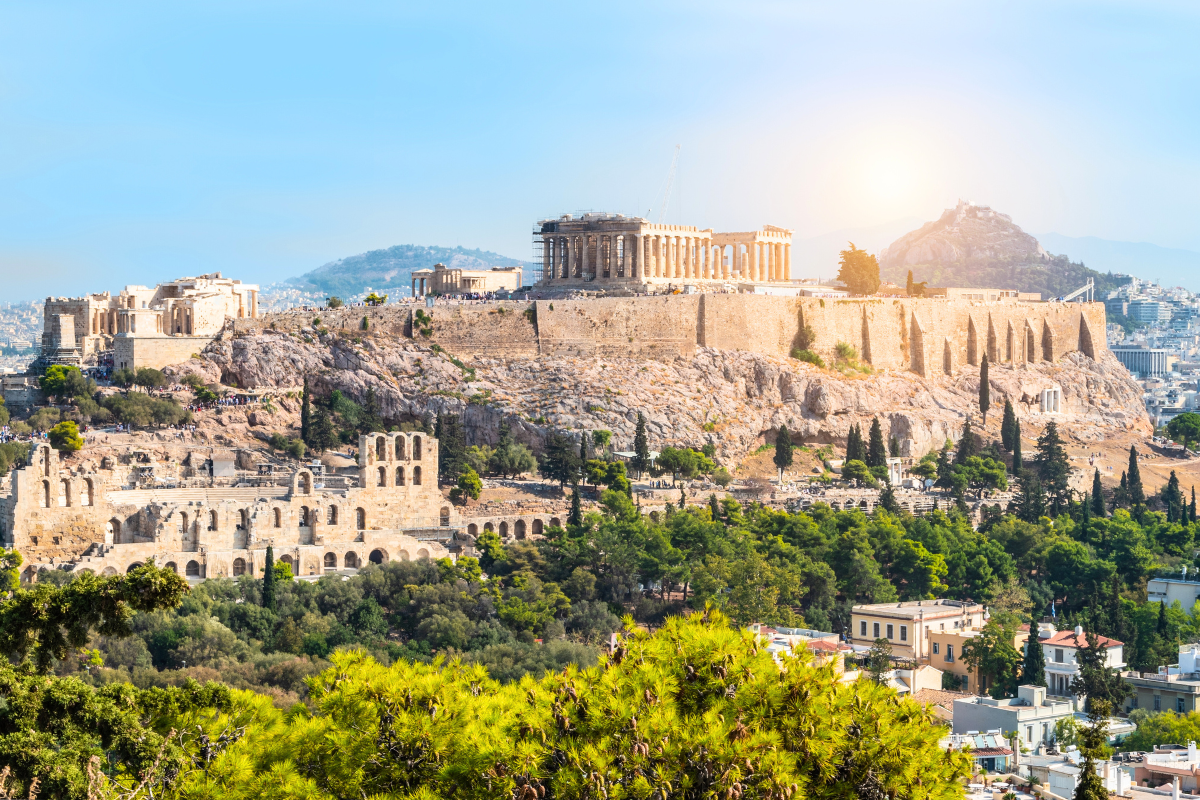
January in Greece brings cooler temperatures, ranging from 5°C to 13°C from night to day, making it the coldest month. While you won’t be swimming in the Aegean, January is an excellent time for cultural exploration without the tourist crowds. Athens, with its museums, ancient landmarks, and cosy cafes, is a prime destination.
The islands, though quieter, are more affordable, with fewer visitors. This time of year is perfect for getting a chance to explore the Acropolis and Delphi without the summer heat and mass tourism that accompanies these destinations for most of the year.
January is the best time to travel to Greece for those who enjoy exploring history, culture, and winter sports.
Greece in February
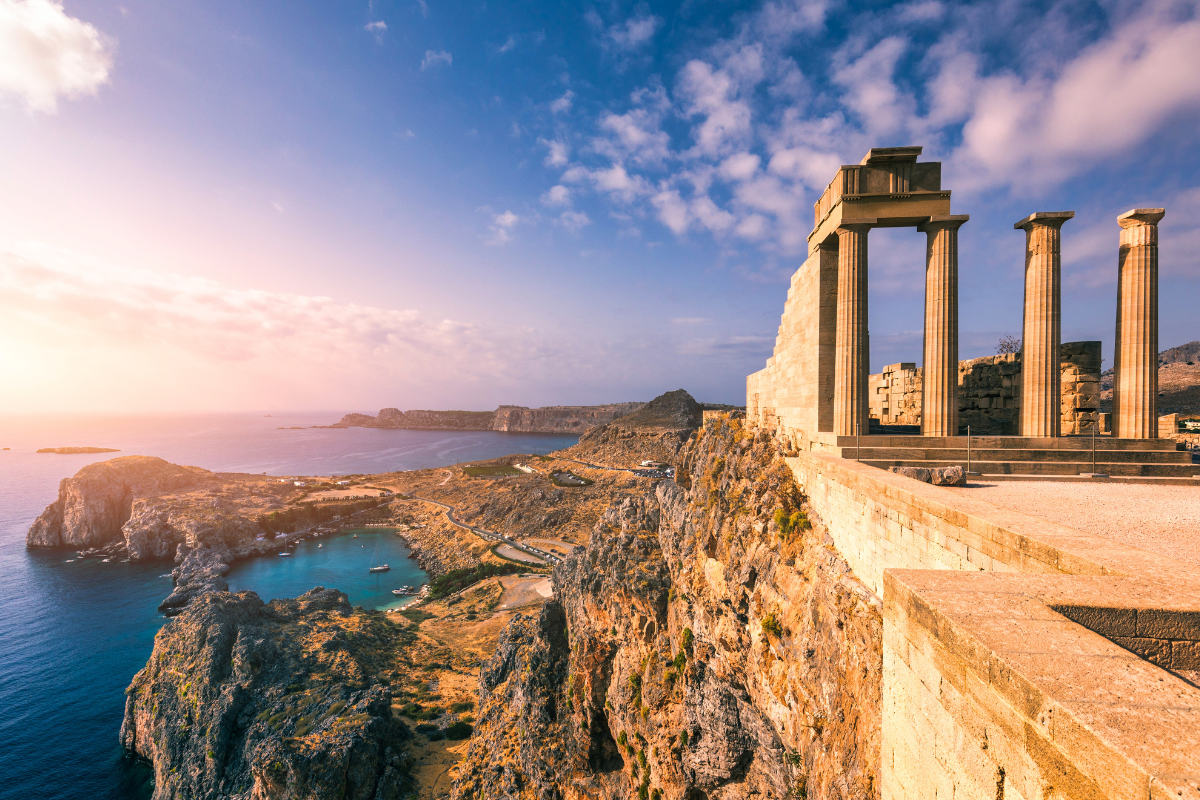
February is still part of the Greek winter, with similar weather to January, though slightly milder. Temperatures hover around 10°C, reaching highs of 15°C. Athens remains lively, offering museums, galleries, and archaeological sites like the Acropolis - a UNESCO World Heritage site - with shorter lines and a more relaxed pace.
The Carnival season, or Apokries, creates a vibrant energy with festivities, parades, and traditional Greek foods. While it’s not the best time to visit Greek islands for beach activities, the islands remain open and charming. February is the best time to go to Greece for travellers interested in culture, carnival celebrations, and fewer crowds in the touristic areas.
Greece in March
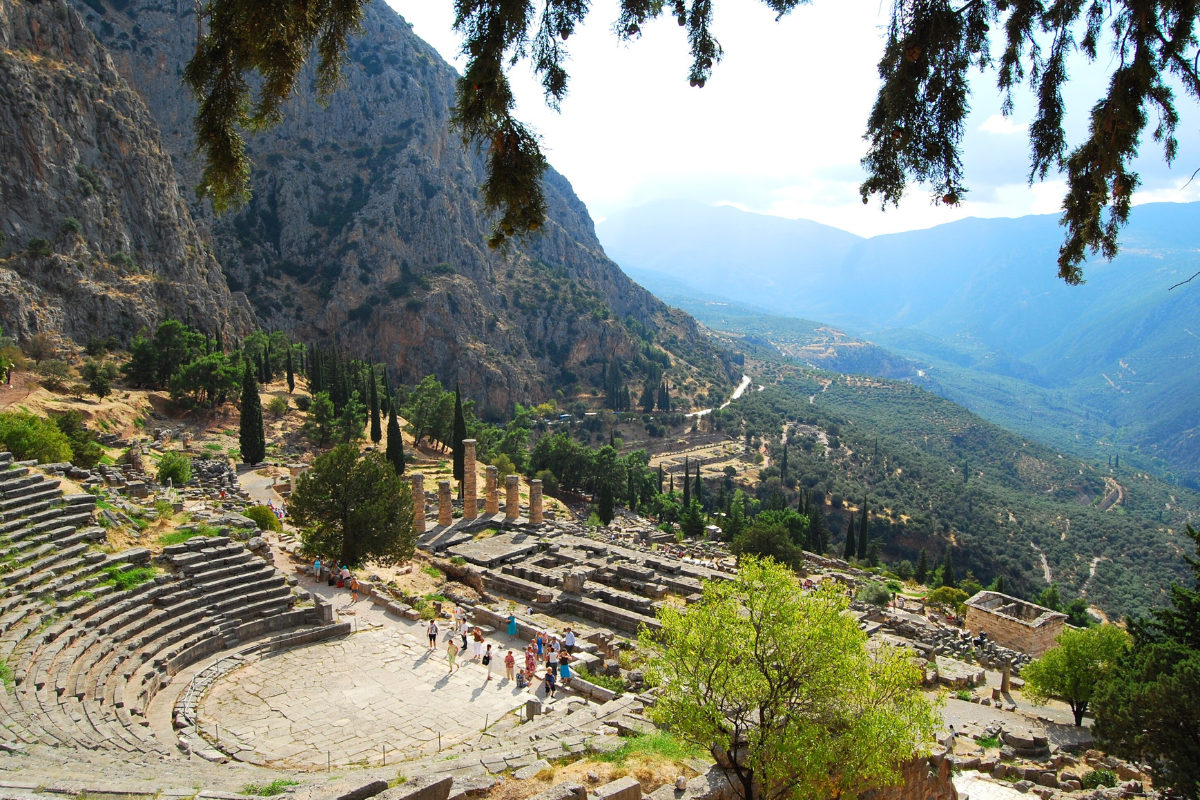
March brings the beginning of spring, with temperatures slowly climbing between 12°C and 17°C. While still cool, it’s a pleasant time for exploring outside in Athens, Thessaloniki, and the archaeological sites in Delphi and Olympia. Nature lovers will enjoy Greece’s landscapes coming alive with blooming wildflowers and greenery.
March isn’t ideal for a beach holiday but it is the best month to go to Greece if you’re a hiker or photographer. For a challenge, you may consider the famous Samaria Gorge hike in the White Mountains of Crete. Depending on your pace and how many times you stop to photograph the spectacular flora and fauna, it takes roughly 6-7 hours to complete the 10-mile rocky trail. Rhodes is another gorgeous island that boasts fantastic sights and natural wonders.
This time of year, the islands remain quiet, but some attractions and accommodations start to reopen in anticipation of the summer crowds.
Greece in April
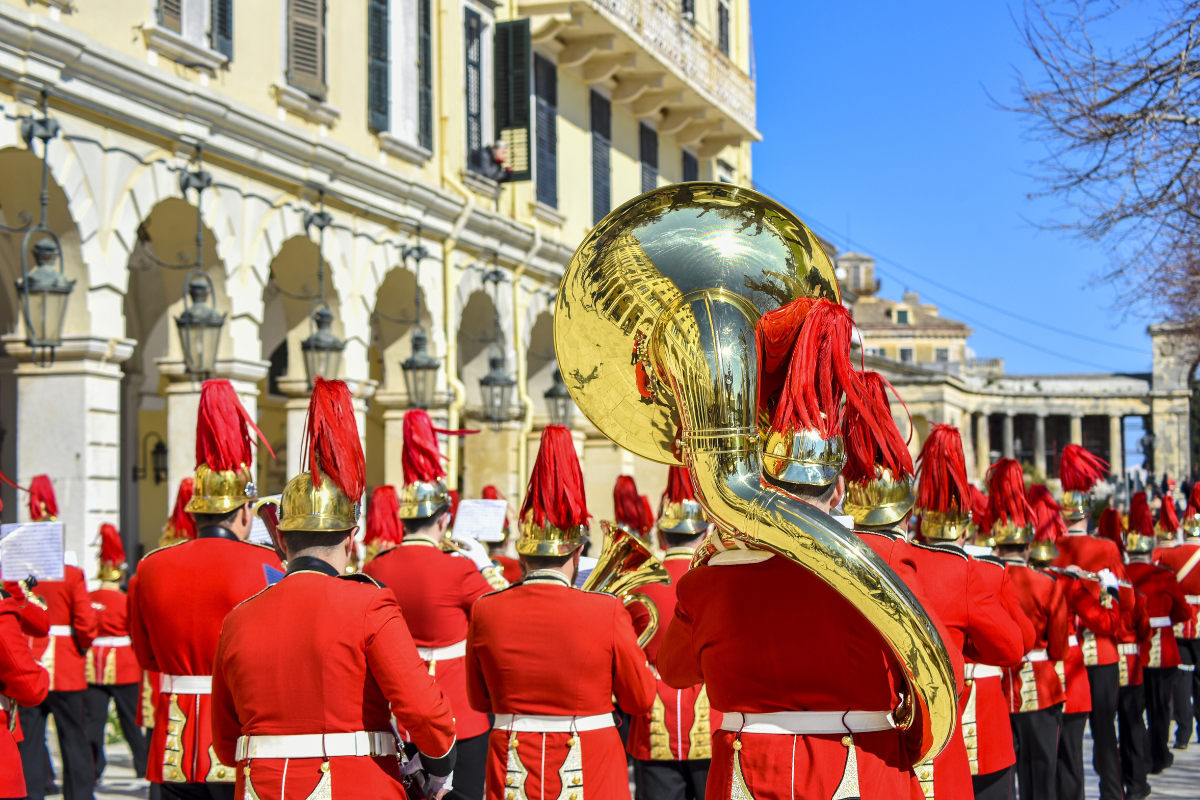
April is when Greece truly blossoms, both in nature and in the atmosphere. With temperatures around 14°C to 21°C, April is the best time of year to go to Greece for comfortable weather and budding landscapes.
This month is perfect for visiting ancient sites in Athens and taking hikes on the mainland or in the Peloponnese region - the birthplace of the Olympic Games. Peloponnese is known for its picturesque landscapes made up of rugged mountains, verdant forests, and crystal-clear rivers. Some of its most beautiful hikes can be found in areas such as Mount Taygetos, Neda Waterfalls, and Lousios Gorge.
You’ll also find there’s quite a lot happening when visiting over Easter, as it’s widely celebrated all over Greece - Corfu in particular. Visitors can experience the local traditions, processions, and feasts during Holy Week which help make your trip unforgettable. April appeals mainly to travellers who love cultural festivities, pleasant weather, and less tourist-heavy environments.
Greece in May

May is often considered one of the best times to go to Greece to bag a holiday before the schools break up and summer crowds start to arrive. The islands start to warm up, with temperatures ranging from 17°C to 24°C, ideal for both sightseeing and lazing on the beach.
The poster destinations in Greece, like Santorini, Mykonos, and Crete are lively but not overcrowded, offering a relaxed atmosphere for both beach lovers and explorers. The beautiful landscapes and longer days make May an excellent month for outdoor activities. Whether you fancy paddleboarding along the turquoise Aegean waters, witnessing history come to life amongst ancient ruins, or dining al fresco at traditional Greek tavernas, you won’t be disappointed.
Greece in June

June marks the start of summer in Greece, bringing long, sunlit days and temperatures between 20°C to 29°C. This month is perfect for beach lovers and sun-worshippers, as the Aegean Sea begins to warm up, offering ideal conditions for swimming, snorkelling, and water sports.
It’s also the best time to travel to Greece if you want to experience island life without the overwhelming crowds that come later in the summer. Popular islands like Mykonos, Santorini, and Naxos are in full swing by June, with vibrant beach clubs, tavernas, and cafes welcoming visitors.
The warmer temperatures and long days are perfect for island hopping or simply lounging on the sandy shores. As the sun sets, beachside tavernas buzz with evening diners savouring the catch of the day and Greek wines. June’s bustling yet relaxed vibe on the islands makes it one of the best times to go to Greece for families and couples looking to enjoy Greece’s famous beach culture without the high-energy peak season.
Greece in July
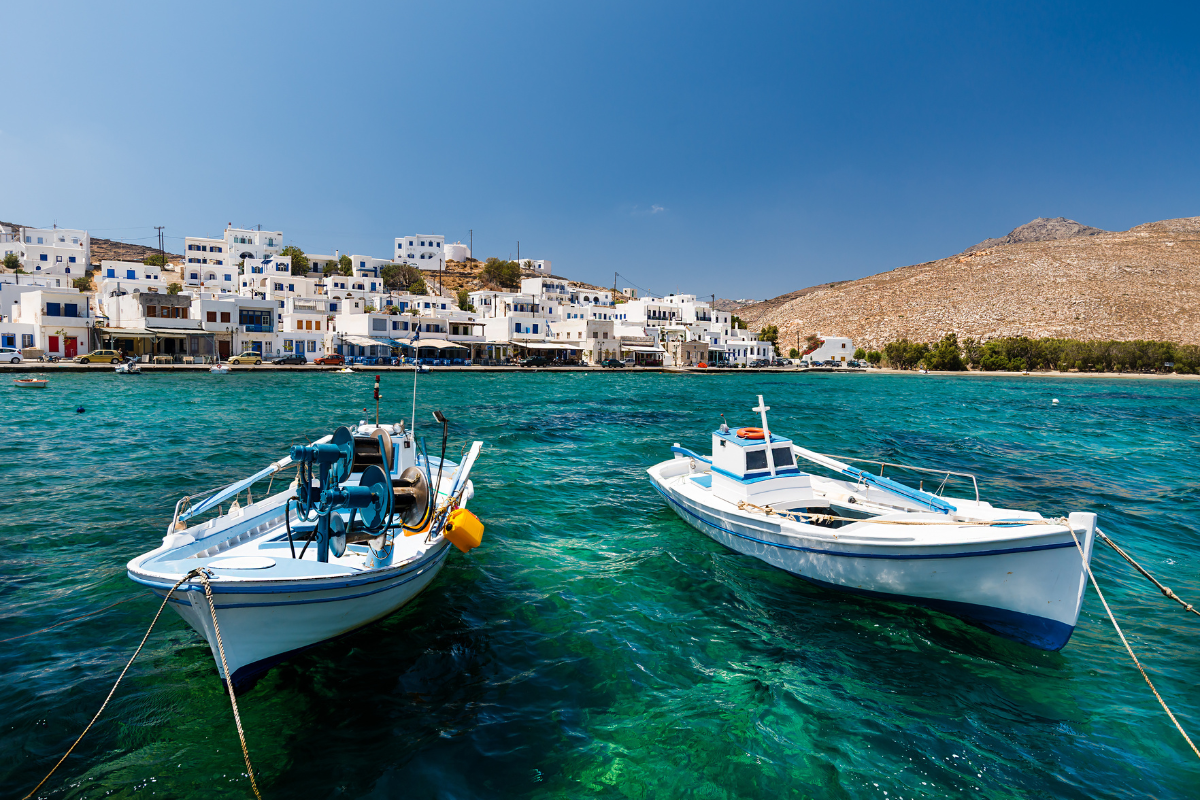
July is one of the hottest months in Greece, with temperatures in the daytime soaring between 28°C and 35°C. The summer heat is matched only by the island excitement, as July marks the peak tourist season in Greece, where islands like Mykonos, Santorini, and Rhodes attract a global crowd. This is the best time of year to go to Greece for those who love a vibrant social scene, lively nightlife, and a bustling beach atmosphere.
If you're looking to go for the great weather but avoid some of the crowds, one of Greek's less trodden islands may be perfect for you. Islands like Evia, Sifnos, Karpathos and Alonissos are smaller gems packed with natural wonders.
In July, the islands come alive with events and activities catering to all types of travellers. From day trips on yachts to beachside music festivals, the options are endless. However, keep in mind that this peak season also means higher prices for accommodations and flights, as well as larger crowds, especially around popular beaches and landmarks. Despite the hustle and bustle, July is perfect for those looking for a high-energy holiday filled with sun, sea, and excitement.
Greece in August

August in Greece is the height of the tourist season, with scorching temperatures sometimes surpassing 35°C, particularly in the Cyclades islands. As the warmest month, it’s also one of the busiest, making August the best month to visit Greece if you enjoy thriving social scenes and crowded beaches filled with people from all over the world. Greek locals also tend to take their holidays in August, contributing to the lively atmosphere on the islands and it adds a bit of authenticity to your trip.
The summer month is packed with outdoor concerts, local festivals, and bustling tavernas that stay open late into the night. Mykonos and Santorini reach their peak energy levels, drawing people in with their chic beach clubs, music events, and stunning coastal scenery.
For a more relaxed but still vibrant experience, consider islands like Halki and Milos, which offer a slightly calmer ambience without losing the summer charm. August is the best time to visit Greece for travellers who want to fully embrace the island lifestyle and experience a quintessential Greek summer.
Greece in September
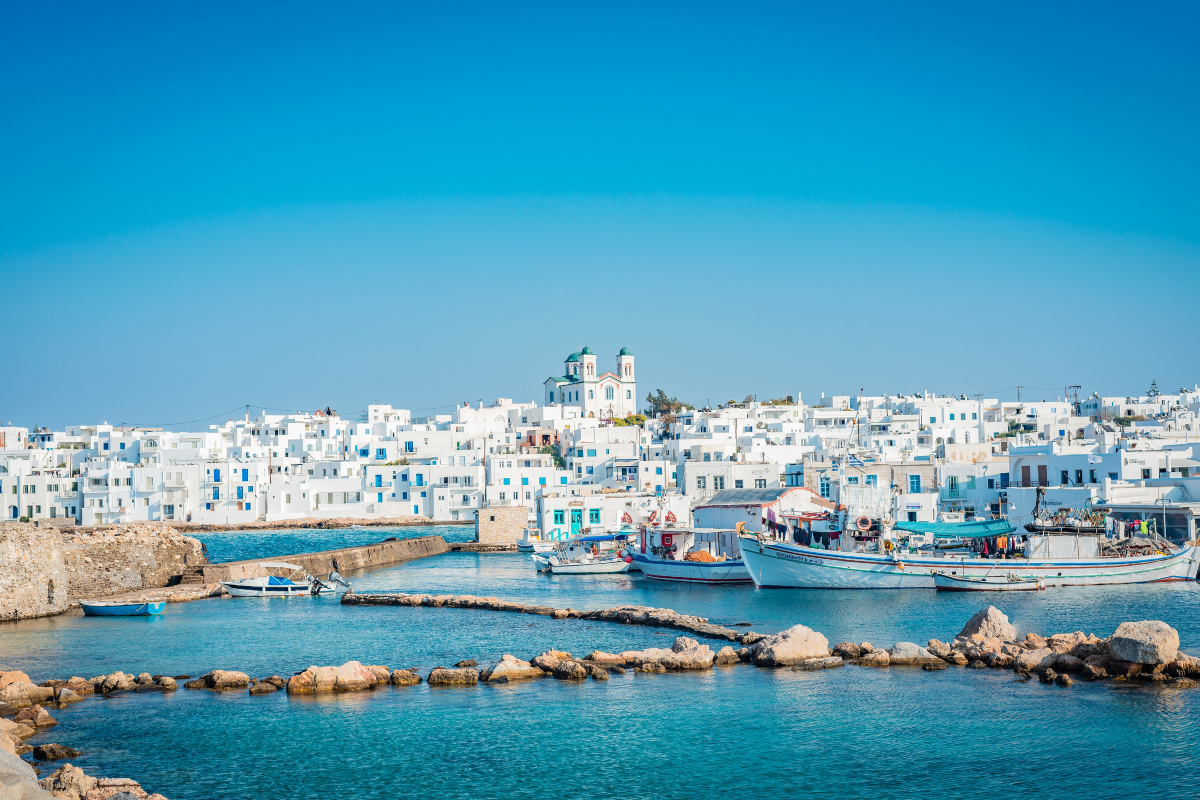
As the high season begins to wind down, with temperatures dropping slightly to around 24°C to 30°C, September becomes one of the best times to visit Greece for a summer experience without the intense heat of July and August. September offers some of the best conditions for exploring the islands, with the sea still warm and perfect for swimming or snorkelling, and the atmosphere taking on a more laid-back vibe.
Island hotspots like Santorini and Mykonos retain their charm without the overwhelming peak season crowds, while smaller islands like Paros and Naxos offer even quieter escapes. This transitional month caters well to couples, families, and solo travellers looking for a peaceful yet vibrant experience in Greece. It’s an excellent time to enjoy both the natural beauty and rich culture of the islands, making September a top choice for a memorable Greek holiday.
Greece in October

October in Greece ushers in the beauty of autumn, with cooler temperatures ranging from 18°C to 24°C. The more comfortable weather makes it one of the best months to visit Greece to blend cultural and outdoor experiences with the last of the beach season, especially early in the month when the sea remains pleasantly warm. Many popular islands, including Corfu, Santorini, and Rhodes, wind down from the summer bustle, offering a more intimate and relaxed vibe.
October is ideal for activities like walking the famous Fira to Oia route in Santorini, grape and olive harvesting, and wine tasting at local vineyards. It’s also a wonderful time for history lovers, as the archaeological sites, such as the Acropolis in Athens or the Palace of Knossos in Crete, are less crowded and more enjoyable in cooler temperatures.
Accommodation and travel costs are also lower, making October perfect for budget-conscious travellers seeking an affordable yet enriching holiday. This quieter season allows visitors to truly soak in the local ambience, appreciate Greek hospitality, and enjoy a more personal connection to the culture and scenery.
Greece in November
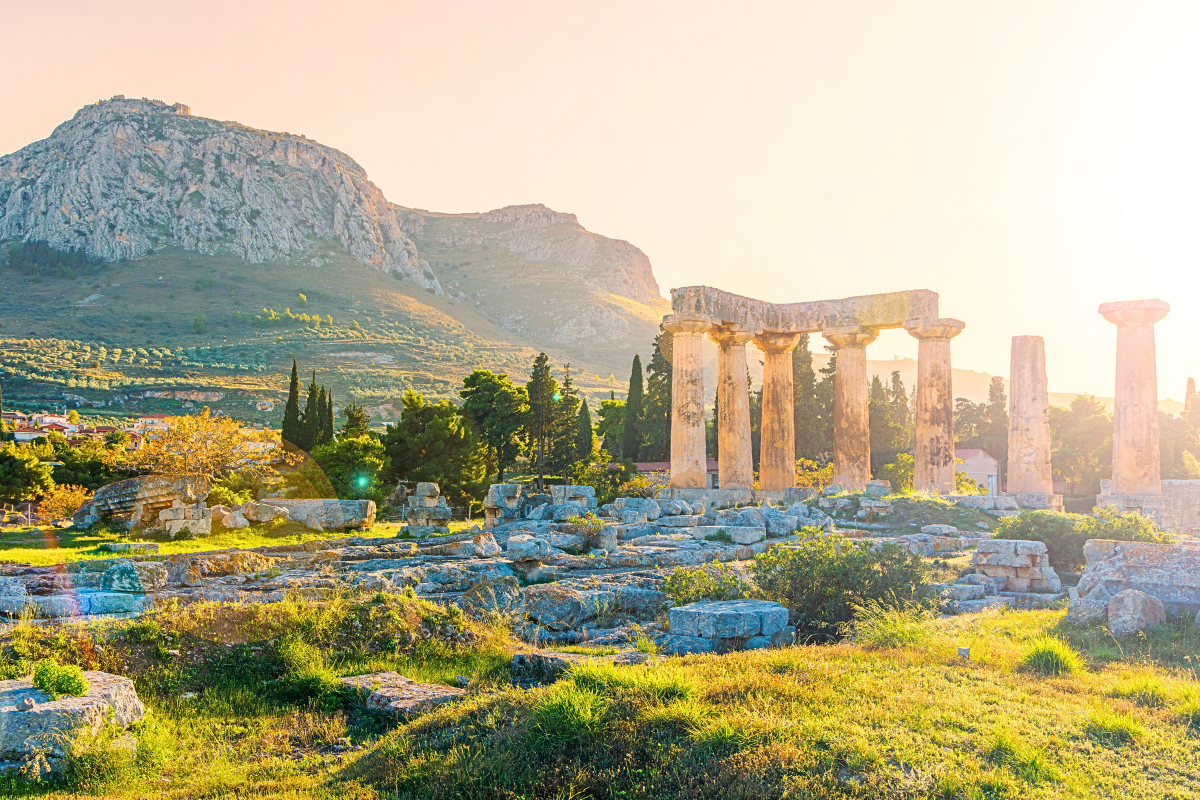
November marks the beginning of Greece’s off-season, with temperatures cooling to a comfortable 14°C to 18°C. While the beach crowds have disappeared, Greece’s cities and mainland areas remain vibrant and full of cultural charm. Athens and Thessaloniki offer plenty of attractions, from bustling local markets to cosy tavernas, where you can enjoy hearty Greek dishes like moussaka and souvlaki.
November is a fantastic month to explore the country’s museums and ancient sites, like the Olympia Archaeological site and the ancient Corinth, without the summer crowds, giving travellers a VIP experience with Greece’s rich history and mythology.
For city-focused travellers, November is one of the best times to go to Greece, as tourism has slowed, prices are lower, and accommodations are more affordable. Though many of the smaller islands close for the season, larger islands like Crete and Rhodes remain accessible. For travellers who love a peaceful atmosphere and an authentic experience, November is the best time of year to go to Greece.
Greece in December

December brings a cosy, festive atmosphere to Greece, with temperatures around 8°C to 12°C during the day. While it may not be beach weather, December is the best time of the year to visit Greece for those interested in holiday festivities and seasonal traditions.
The cities, especially Athens, come alive with Christmas lights, markets, and holiday events. You’ll find festive treats like melomakarona (egg-shaped honey cookies) and kourabiedes (almond butter biscuits) in bakeries, while public squares host carol singing and tree lighting ceremonies. The charm of Athens’ Christmas markets offers a unique way to enjoy the city’s culture and cuisine.
For outdoor enthusiasts, December also marks the start of the winter sports season in Greece’s mountainous regions, such as the Pindus Mountains, where visitors can enjoy skiing, snowboarding, and cosy mountain lodges. With its blend of festive cheer, rich cultural experiences, and opportunities for winter sports, December offers a different and magical way to experience Greece.
Summary

Choosing the best time to visit Greece depends on what you want from your trip. From vibrant summers to peaceful winters, Greece offers something for everyone throughout the year. For beach lovers, June to September is ideal, while May and October are perfect for a blend of culture, mild weather, and fewer tourists. Winter is quieter but still offers cultural depth in cities like Athens and Thessaloniki. With this guide, you can now plan the best time of year to go to Greece for a memorable holiday tailored to your preferences.
If you’re thinking about planning a trip to Greece, Olympic Holidays can help you organise unforgettable holidays to various islands across the archipelago. Take a look at our Greece holidays page, or check out our latest holiday deals.



